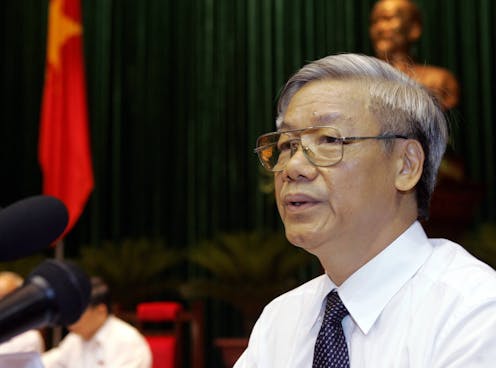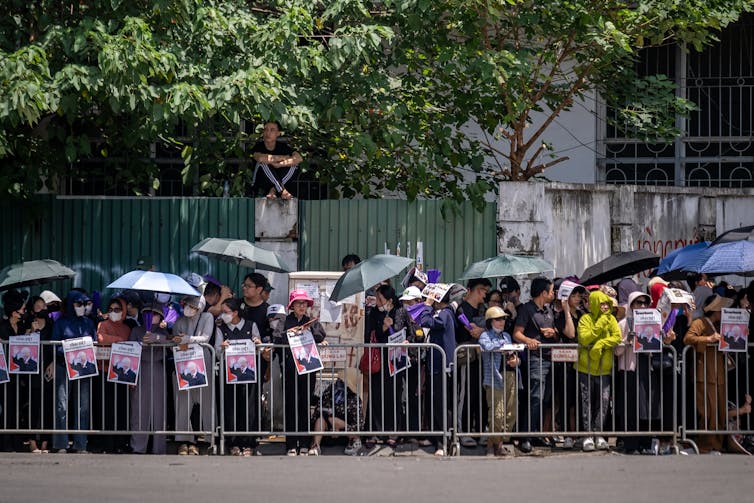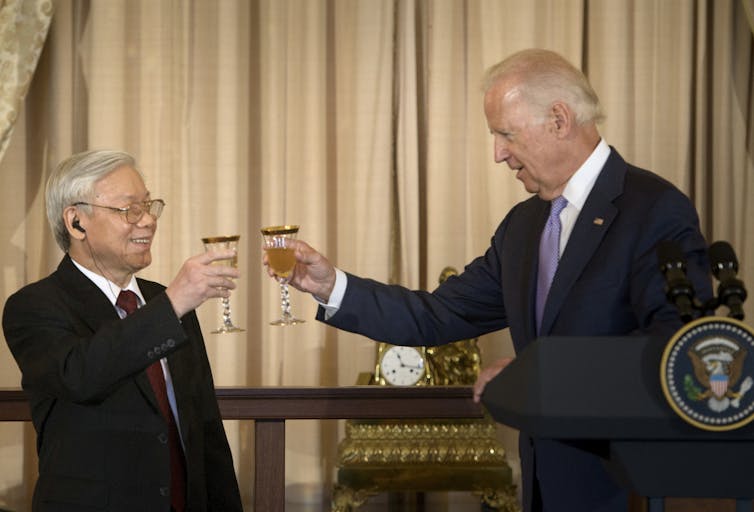
As a rule, the U.S. secretary of state does not attend the funeral of the general secretary of a Communist party.
Yet that is exactly what Washington’s top diplomat, Antony Blinken, had planned to do for the last rites of Nguyen Phu Trong, the longtime leader of Vietnam, who died in office on July 19, 2024, aged 80. Ultimately, Blinken couldn’t make it to the funeral, but he did visit Hanoi a day later.
There, he paid his respects to the Vietnamese government and to the family of Trong, whose 13-year rule saw the country make enormous strides, including a drastic decline in the nation’s poverty rate – from 14% of the population in 2010 to 4% in 2022.
The passing of leaders provides an opportunity to draw a balance of their performance in office, to examine how the country did in that period, and what the way forward looks like. In that regard, Trong can be proud of his record – Vietnam has made much economic and social progress and looks set to continue along that route. Moreover, the legacy of Trong’s set of foreign policy principles – known as “bamboo diplomacy” – serves as a model for smaller states as they navigate the complexities of shifting geopolitics and growing tensions between the U.S. and China.
Vietnam’s success story
Vietnam was already on an upward trajectory when Trong came to power in 2011 as the most powerful figure in the country’s ruling Communist Party.
After decades of stagnation and abject poverty, the opening up of Vietnam’s economy under the “Doi Moi” – or renovation – reforms of 1986 led to what the World Bank refers to as a “development success story.”
The reforms helped Vietnam transition from being one of the poorest countries in the world to a middle-income nation over a 40-year period.

Under Trong’s watch, the country of close to 100 million people has seen average annual growth of 5.8% – one of the highest in Asia and the world.
And despite its “sandwich” position in the current great power competition, Vietnam under Trong managed to maintain good relations with Beijing, Moscow and Washington. Indeed, Vietnam has emerged as a key player in Asia.
To the surprise of many international observers, it joined the negotiations for the Trans-Pacific Partnership – the only socialist country to do so – and has been, since 2018, a member of the successor to the Trans-Pacific Partnership, the Comprehensive and Progressive Trans-Pacific Partnership. In 2020, Vietnam joined the Regional Comprehensive Economic Partnership, the biggest trade agreement anywhere in the world.
Trong’s agenda
Yet Trong’s achievements weren’t foregrounded in some of the reports of his death. International coverage of the occasion was prone to fall back on the cliches that Western media too often bestows upon developing country leaders.
“Hardliner” and “Marxist-Leninist ideologue” were the terms used to describe him in rather one-dimensional reports.
To his credit, Blinken described Trong as “a visionary leader” in his tribute.
Other U.S. politicians haven’t always looked upon Trong in such a positive light. During Trong’s historic visit to the White House in 2015, the Obama administration was slammed by Democratic and Republican lawmakers for accommodating the figurehead of “an authoritarian one-party system” responsible for a “deplorable human rights situation” in Vietnam.
Yet, while Vietnam is far from being a democracy – the one-party state does not allow much room for dissent, and there are, according to some estimates, around 160 political prisoners – that is only part of the story.
Focusing on civil and political liberties to the exclusion of almost everything else, including socioeconomic development, misses much of what is happening in the Global South.
Even Trong‘s anti-corruption “blazing furnace” campaign – which reached deep into the highest levels of the party and state, leading to the disciplining of thousands, including two former presidents and seven members of the Politburo of the Communist Party – was dismissed by some in the West as a power grab or an antibusiness witch hunt.
A different approach
In my view, Trong was a remarkable man with an enviable record. In contrast to other Vietnamese officials, he was modest and unassuming, lived in ordinary, government-provided housing, drove an old, battered Toyota Crown and was steeped in the mores of Vietnam’s collective leadership traditions.
Trong trained as a historian, having done postgraduate studies in Moscow – a background that helped shape his vision of what Vietnam needed to do in the new century.
Aware that in the past Vietnam had repeatedly won wars against formidable foes – the French in 1954, the Americans in 1975 and the Chinese in 1979 – only to lose the ensuing peace because of taking uncompromising positions, he tried a different approach.

On the economic front, this meant opening Vietnam up for business, making a pitch for foreign investment and doubling down on the promotion of local manufacturing and of the export sector. Trong was especially successful in attracting U.S. companies eager to diminish their dependence on their operations in China, and to rely on “friend-shoring” – that is, investment that goes to countries seen as friendly.
Amazingly, he was able to do the same with China.
This careful cultivation of ties with both Washington and Beijing was the root of “bamboo diplomacy,” the foreign policy strategy that Trong will be best remembered for.
The strategy – which Trong outlined in 2016 in a speech which noted that, like bamboo itself, a successful foreign policy needed “strong roots, stout trunk and flexible branches” – was triggered by the growing tensions between China and the United States.
What is bamboo diplomacy?
At heart, bamboo diplomacy is about refusing to take sides in the politics of great power competition. It is guided by the “Three Noes” policy, as outlined in a book Trong published in 2023: no military alignment or alliance with any power, no military bases on Vietnamese soil, and no reliance upon another country to counter a third party.
In practice, bamboo diplomacy entails a policy of hedging, diversifying foreign partners and of ambiguity. It keeps a country’s options open in shifting geopolitical environments in which today’s friend may become tomorrow’s foe.
And it works. It is a measure of the success of this policy that in the space of just a few months, Presidents Joe Biden, Xi Jinping and Vladimir Putin all visited Vietnam – something no other country can claim.
Bamboo diplomacy is especially apposite for smaller nations having to contend with great power competition. And it has parallels with the doctrine of active nonalignment that has taken hold in parts of Latin America and elsewhere in the past few years. The strategy stresses the role of agency and initiative in dealing with uncertainty and a complex environment, as opposed to the more defensive posture that characterized the nonalignment of yesteryear.
Trong’s last few years played out against the backdrop of an especially turbulent period in world affairs, marked by escalating tensions between great powers, a devastating pandemic and two major wars – one in Ukraine and one in the Gaza Strip. But throughout, Vietnam managed to thrive and prosper.
It has done so for a variety of reasons. But there is no doubt that Nguyen Phu Trong’s leadership and his deft deployment of bamboo diplomacy played a key role in Vietnam’s success.
Jorge Heine is a member of the Party for Democracy, a Chilean political party, and of the Foro Permanente de Politica Exterior, a Chilean think tank.
This article was originally published on The Conversation. Read the original article.







